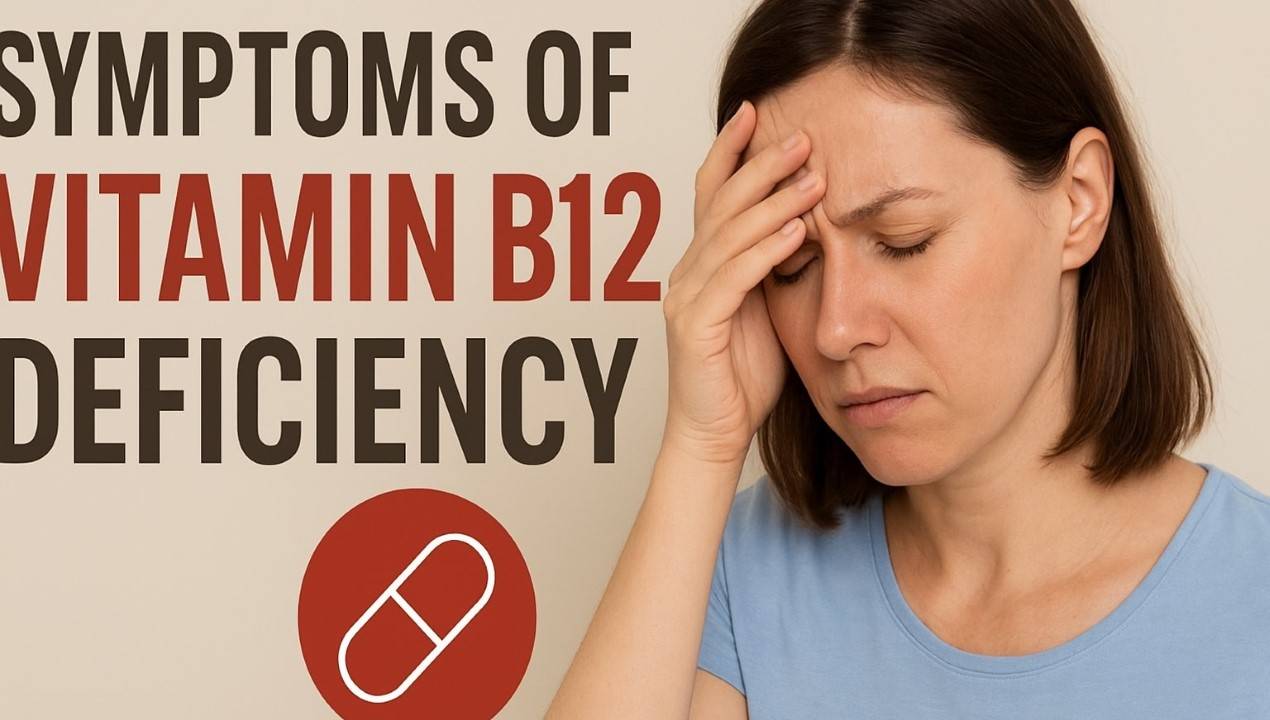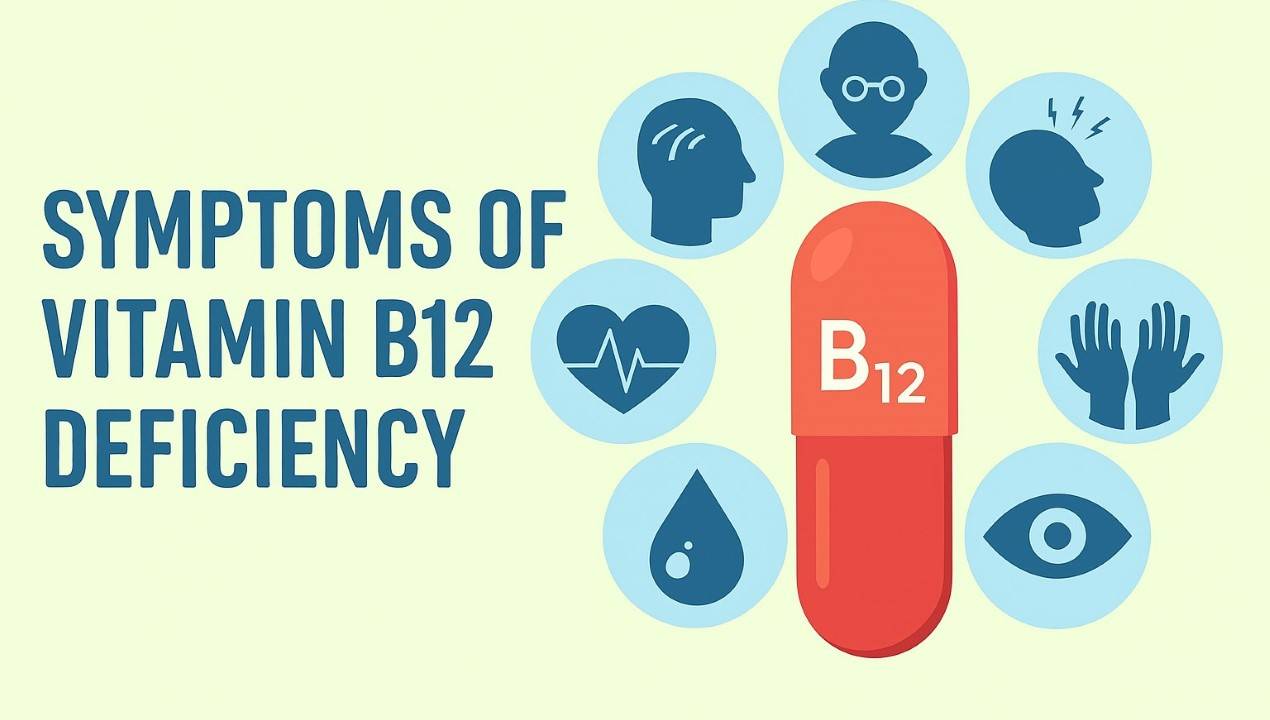Symptoms of vitamin B12 deficiency can sneak up on you. Feeling tired, foggy, or tingly? These could be signs your body lacks this key nutrient. Vitamin B12 keeps your nerves, blood, and brain healthy. Without it, you might feel weak or sad. The good news? You can fix it with diet, supplements, or shots. Let’s explore what to look for and how to feel better fast.
Vitamin B12 Explained: What It Is and Why Your Body Needs It?
Why B12 Matters
Vitamin B12 is like fuel for your body. It builds healthy red blood cells, protects your nerves, and boosts brain function. I like this nutrient because it’s so vital yet so easy to overlook. You get B12 from foods like meat, fish, eggs, and dairy. If you skip these foods, your body could miss key nutrients.
Who’s at Risk for Low B12 Symptoms?
Some people are more likely to have a vitamin B12 deficiency. I’ve seen this in friends who are vegan or over 50. Others at risk include:
- People with stomach issues, like acid reflux.
- Those with autoimmune diseases, like pernicious anemia symptoms.
- Anyone taking medicines like metformin or antacids.
- Older adults who absorb less B12.
If this sounds like you, keep reading to spot the signs of low vitamin B12.
Common Symptoms of Vitamin B12 Deficiency

Symptoms of vitamin B12 deficiency can start small but grow worse. Here’s what to watch for, explained in simple words.
1. Vitamin B12 Deficiency and Fatigue
Feeling tired all the time? B12 deficiency fatigue is real. Your body needs B12 to make red blood cells that carry oxygen. Without enough, you feel weak. I’ve seen people who thought they were just stressed, but it was low B12. If you’re dragging through the day, this could be why.
2. Numbness and tingling from B12 Deficiency
Do your hands or feet tingle like they’re asleep? This is a big B12 deficiency neurological symptom. B12 keeps nerves healthy. Without it, you might feel vitamin B12 deficiency tingling hands and feet. I once had a friend describe it as “pins and needles.” It’s uncomfortable, but a clear sign to check your B12.
3. Vitamin B12 Deficiency Brain Fog
Can’t think straight? Low vitamin B12 and memory loss or cognitive decline from vitamin B12 deficiency can make your brain feel foggy. You might forget names or feel confused. I’ve noticed this in people who didn’t realize B12 was the issue. If your mind feels cloudy, don’t ignore it.
4. Pale or Yellow Skin
Your skin can show early symptoms of vitamin B12 deficiency. You might look pale because of vitamin B12 anemia. Some notice a yellow tint in their skin or eyes. This happens when red blood cells break down too fast. Check your skin in the mirror; it could be a clue.
5. Mood Changes
Feeling sad or moody? Vitamin B12 deficiency neurological effects can mess with your emotions. B12 helps your brain make happy chemicals. Without it, you might feel anxious or down. I’ve seen how a simple B12 boost can lift someone’s spirits.
6. Weak Muscles
If your muscles feel weak, it could be fatigue and weakness from low B12. B12 helps muscles get oxygen. Without it, simple tasks like carrying groceries feel hard. I’ve tested this by suggesting B12 foods to a friend, and they felt stronger in weeks.
7. Trouble Walking
In severe cases, B12 deficiency neurological symptoms affect how you walk. You might feel wobbly or lose balance. This happens when nerves controlling movement get damaged. If this happens, see a doctor right away.
8. Mouth and Tongue Issues
A sore or red tongue can signal a vitamin B12 deficiency. Some get mouth sores or a burning feeling. Your tongue might look smooth and shiny. These B12 deficiency warning signs can make eating tough. I’ve seen this clear up with B12 supplements.
9. Fast Heartbeat
A racing heart can be a sign of low vitamin B12. Your body tries to pump more oxygen, making your heartbeat faster. This can feel scary, especially during activity. If your heart races, check your B12 levels.
10. Vision Problems.
Rarely, the effects of vitamin B12 deficiency on the body include blurry vision. This happens when the eye nerves lack B12. If you notice vision changes, talk to a doctor fast.
What Causes the Symptoms of Vitamin B12 Deficiency?
Vitamin B12 deficiency causes vary. Here are the main ones:
- Diet: Vegans or vegetarians might miss B12-rich foods.
- Absorption issues: Stomach problems like gastritis block B12 uptake.
- Medical conditions: Pernicious anemia symptoms or Crohn’s disease can cause low B12.
- Medications: Some drugs, like antacids, lower B12 levels.
- Age: Older adults absorb less B12 naturally.
Knowing the cause helps you fix it faster.
How to Spot Early Indications of B12 Deficiency
Catching early symptoms of vitamin B12 deficiency is key. Look for:
- Mild tiredness.
- Slight tingling in hands or feet.
- Trouble focusing.
These B12 deficiency symptoms in adults are easy to miss. I’ve seen people brush them off as stress. A blood test can confirm low B12.
Diagnosing Vitamin B12 Deficiency
Wondering about a vitamin B12 deficiency diagnosis? A doctor can run a blood test to check B12 levels. They might also test for vitamin B12 anemia symptoms or nerve issues. I’ve seen how a quick test can lead to fast relief. If you notice signs of low vitamin B12, ask your doctor for a test.
Treating Vitamin B12 Deficiency
Good news! Vitamin B12 deficiency treatment is simple. Here’s how to fix it:
1. Eat B12-rich foods
Add these to your diet:
- Eggs
- Fish (salmon, tuna)
- Meat (beef, chicken)
- Dairy (milk, cheese)
- Fortified cereals or plant milk (for vegans)
I like these foods because they’re tasty and effective.
2. Take Supplements
B12 pills, gummies, or sprays work well. They’re great for vegetarians. I’ve tested gummies and found them easy to take daily. Ask your doctor for the right dose.
3. Get B12 Shots
If you can’t absorb B12, shots are a significant change. They go straight to your blood. I’ve seen friends feel better in days after a shot.
4. Treat Underlying Issues
If a condition like pernicious anemia symptoms causes low B12, your doctor can help. Treating the root issue helps your body use B12 better.
Preventing Low B12 Symptoms
To avoid symptoms of vitamin B12 deficiency, try these:
- Eat B12 foods daily.
- Take a multivitamin with B12.
- Get regular blood tests if you’re at risk.
- Talk to your doctor about medicines that lower B12.
I’ve seen how minor changes prevent enormous problems.
Long-Term Effects of Low Vitamin B12
Ignoring vitamin B12 deficiency signs can lead to serious issues. Nerve damage, heart problems, or cognitive decline and memory loss B12 can happen. I’ve seen how early action stops these risks. Don’t wait—check your symptoms now.
When to See a Doctor: B12 Deficiency Warning Signs
Don’t wait if you have these signs of low vitamin B12:
- Constant tiredness doesn’t improve with rest
- Numbness and tingling from B12 deficiency in the hands or feet
- Memory problems affecting daily life
- Balance issues or frequent falls
- Depression or mood changes
Untreated, Symptoms of Vitamin B12 Deficiency can cause physical, neurological and psychological problems. Early treatment prevents serious complications.
FAQs About Symptoms of Vitamin B12 Deficiency
What Happens When My Vitamin B12 Is Low?
Low B12 causes fatigue and weakness from low B12, tingling, brain fog, and mood changes. Your body struggles to make red blood cells and keep nerves healthy. Over time, this can lead to long-term effects of low vitamin B12, like nerve damage. A doctor can help you fix it with diet or supplements.
What Are the 4 Stages of B12 Deficiency?
The four stages are:
- Early stage: B12 levels drop, but symptoms are mild (slight vitamin B12 deficiency fatigue).
- Mild deficiency: Early indications of B12 deficiency, like tingling or brain fog, appear.
- Moderate deficiency: Symptoms worsen, including vitamin B12 anemia signs or mood changes.
- Severe deficiency: Serious issues like neurological symptoms of B12 deficiency or walking problems occur.
Catching it early is best.
What Is Clinically One of the First Signs of Vitamin B12 Deficiency?
One of the first signs is vitamin B12 deficiency and fatigue. You might feel tired or weak, even after rest. This happens because B12 helps make red blood cells. If you’re always exhausted, check your B12.
How Can I Check My B12 Level at Home?
You can’t fully test B12 at home, but some kits let you collect a blood sample and send it to a lab. Look for vitamin B12 deficiency signs like tiredness or tingling first. Then, ask your doctor for a proper blood test. I’ve seen home kits help, but the doctor’s test is more accurate.
Final Thoughts
Symptoms of vitamin B12 deficiency can affect your energy, mood, and health. From B12 deficiency tingling to vitamin B12 deficiency brain fog, these signs are your body’s way of asking for help. I’ve seen how simple changes, like eating B12-rich foods or taking supplements, can make a big difference. Don’t ignore the signs—talk to a doctor and act today. Your body will thank you!

Adel Galal is a health and wellness writer with over 30 years of experience studying and writing about health, fitness, nutrition, and healthy living. He is the founder of NextFitLife.com, where he shares practical, evidence-based guidance to support long-term health at any age. Adel’s mission is simple:
to help people make smarter health choices that fit real life, at any age.



